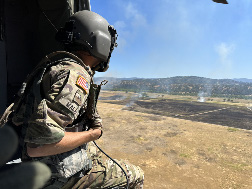Story by Spc. Midori Preecs
Army training is one of the fundamental components to ensuring the U.S. military’s overall readiness. It equips Soldiers with the necessary skills, knowledge, and mental resilience to effectively respond to various operational challenges and real-world combat scenarios.
During live-fire training with the M2A1 machine gun on June 5, 2024, at Fort Hunter Liggett, a fire broke out at the range. Soldiers with the 1-158th Assault Helicopter Battalion flying a UH-60L Black Hawk provided resources to help contain and extinguish the fire.
“We staged crews during the live fire ranges that took place on June 5th through the 8th. Our crews were going out for continuous training but were on shift if a real-world call came through range control. They received a call about the range fire, and we could all see the smoke at that point. Our crew shifted gears from training to real-world fire, and they were able to provide water to help contain the fire while ground fire support was able to put it out,” said Capt. Caleb Rowell, Alpha Company Commander of the 158th Assault Helicopter Battalion.
At the time of the fire, the Army Reserve Aviation flight crews were engaged in active training and qualification on the helibucket, more well-known as the Bambi Buckets, explained Rowell.
A Bambi Bucket is a specialized firefighting tool that delivers water or fire retardants from helicopters to extinguish fires. The bucket is suspended from a helicopter on a long line, allowing the helicopter to dip the bucket into a water source and then transport and release the water or retardant onto the fire.
“This was my first time training on this type of equipment. I was not Bambi Bucket qualified, so it was all new to me,” said Chief Warrant Officer 2, Samuel Allison, a Pilot in Training with the 158th Assault Helicopter Battalion. He was alongside Chief Warrant Officer 3, Kerry Julian, the Pilot in Command on the UH-60L.
Julian said. “The nature of the Army is 90% training, so when you see it in action, it's more rewarding. That was the first time I've ever put water on a real fire, and I've trained several Soldiers on Bambi Buckets.”
When learning a new subject or training in a new area, it's crucial to understand how this training contributes to creating a more prepared and effective force. “Getting those raw experiences is what truly tests the Soldier's ability to adapt and overcome and puts more purpose into why we train,” said Julian.
Leadership often encompasses invaluable experience gained from real-world scenarios. Passing this knowledge down helps junior Soldiers learn from past successes and mistakes, enhancing their preparedness and decision-making abilities.
Staff Sgt. Nicholas Malek, a Crew Chief with the 158th Assault Helicopter Battalion, said, “I’m always excited to train these guys on new tasks because it's not just me, I can’t do it all. I need my junior crew chiefs to be able to function, especially when I leave. I want them to carry on that tradition, knowledge, and gain experiences.”






